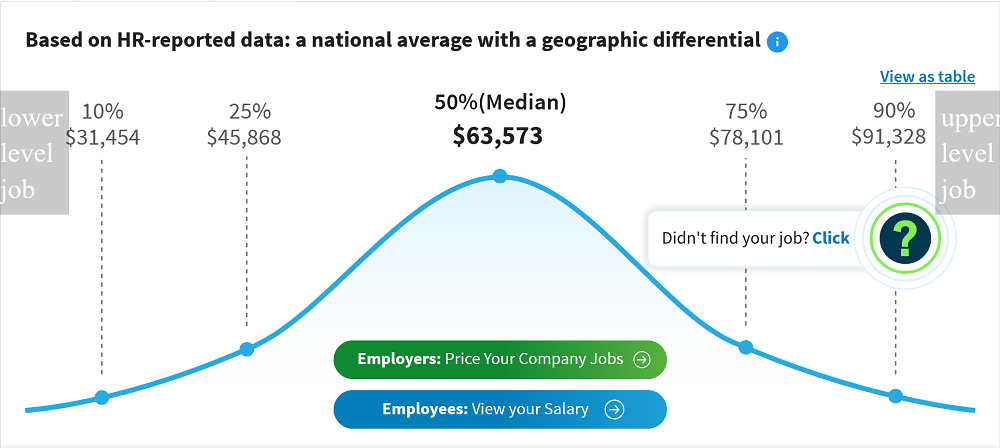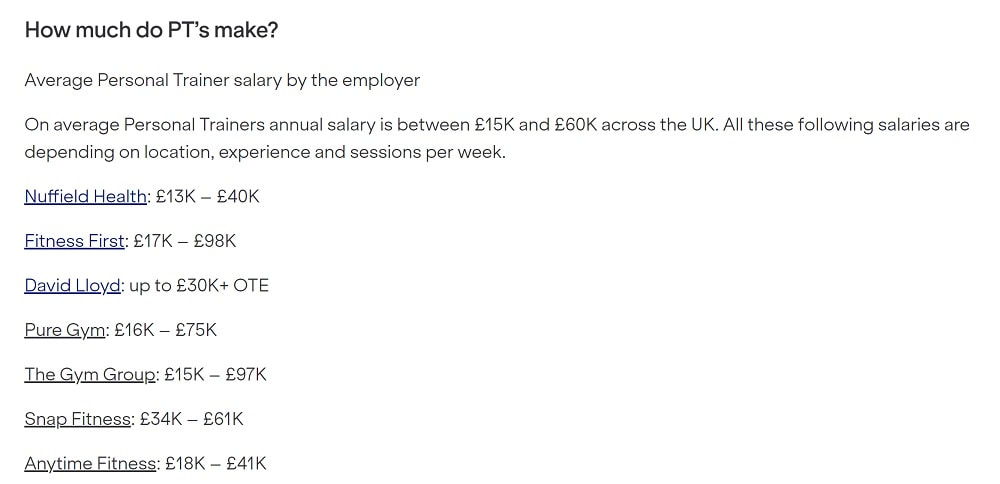|
FREE GUIDE: HOW TO LAUNCH AN ONLINE PERSONAL TRAINING BUSINESS
IN JUST 7 DAYS
✓ The new, better way of launching an online business
✓ The fastest way to create in irresistible offer ✓ A simple system to sell to clients who are interested |
|
If you're looking for a new career as a personal trainer, it's essential to understand the salary range and factors influencing your income. This article will discuss what to expect in terms of revenue as a newly qualified personal trainer and what factors play a role in how much you can earn. How Much New Personal Trainers Can Expect to Earn? The average annual salary of a personal trainer in the US is around $63,000, with the lowest end just below $46.000. As a newly qualified personal trainer in the UK, your income may start at approximately £15,000 per year. With experience and good marketing, you can expect to make up to £60,000 annually. However, many factors affect how much money you can make as a personal trainer, including industry, location, experience, education certification, social media presence, and client base. Aspects Affecting a Personal Trainer's Salary As a freelance personal trainer, you can earn anywhere between £20 to £100+ hourly according to FutureFit, depending on a range of factors we already mentioned above. The hours you work will also affect your pay as this profession requires many early mornings or late nights during the week. So, let's dig into the aspects that will affect your earning potential. The Facility You Work At If you choose to work for an organization, such as a gym or sports club, there may be limited positions available, and they are likely going to pay less than a private fitness studio would. Being employed or working as a contractor can also make a big difference in how much you can earn. Private studios often offer more competitive rates of pay compared to public gyms. Still, prospective trainers must research the market thoroughly before committing themselves to one particular type of company. Employed or Self-Employed? Ask yourself if being employed by an organization is what you want from your career? If not, then perhaps self-employment is better suited for you. It might take longer when starting on this route, but once established, many people report having greater control over their schedule, which can be more flexible than traditional employment. Personal trainers can work as employees for a gym or fitness centre, but many also freelance or contract their services. This option has its pros and cons. On the one hand, you are your boss and have more freedom regarding hours and where you work. Source: FutureFit However, on the other hand, it can be challenging to find clients without an established reputation or referral base. Furthermore, as a contractor, you will need to charge more than if a company employed you to compensate for the lack of benefits (health insurance) and stability. The main difference between an employed and a contracted self-employed personal trainer's salary is that the freelancer's hourly rate can be higher and that the trainer has control over their earnings. In contrast, in the case of an employment contract, your earnings will be pretty fixed. Your Physical Location Your location has a massive impact on your earning potential. Just like the minimum wage changes depending on where in the UK you are, your local area will also affect how much you can charge your clients because of the cost of living. London personal trainers can easily charge anywhere £60 and up while trainers living in the North of England in more rural areas may not have that opportunity. Londoner trainers will spend a lot more on their living costs in exchange. The location of where you work might limit how much you can charge your clients because of local competition as well. For example, clients might be willing to pay less since finding alternative trainers could be relatively easy if you're based in a small town. However, this isn't usually the case when working within more prominent cities like London and New York City, where demand outweighs supply. How Much Experience You Have Experience is a significant factor in earning potential as a personal trainer, just like any other profession in any industry. It's assumed that the longer you've been working as a personal trainer, the more expertise, knowledge and better skills you have to help your clients achieve their fitness goals. On the other hand, if you stay consistent with practising your coaching skills, enrol on more specialist courses over the years to widen your knowledge in particular areas and keep on top of the latest scientific research in fitness, the more confident you will become to ask for more money for your services. Plus, the more happy clients you have over the years, the more referrals you will get, which means your calendar will get full eventually. Asking for more money will help you attract clients with higher net worth so you can make more money even when working the same number of hours or less. Full-Time or Part-Time The number of hours you work as a personal trainer in a week is another crucial element to understanding how much money you can earn a month or year. Imagine you charge £50 for an hour to keep it simple. If you can complete 20x 60-min sessions a week, you'll have earned a grand every week. If we consider two weeks off for Christmas and only one 2-week holiday, which is not a lot, you work 48 weeks like that per year. That equals a £48,000 yearly income. However, you probably want to calculate how many hours you will actually have to work to deliver those 20 sessions consistently every week. Designing your clients' workout plans, messaging back and forth for schedule, talking to prospective clients, promoting your services, writing social media posts and blog articles and so on. This is important so you can see what your capacity really is. It would be easy to say that you could earn £96,000 per year based on the above example but delivering 40 sessions a week. We're not saying it can't be done, but you might be looking at working upwards 60hrs per week to achieve that. That's a lot of work to do for 48 weeks per year. Conclusion A personal trainer's earning potential is affected by many factors, including location, experience, employment status and working hours. If you're starting now, it's worth understanding what you can expect in the first year and your growth potential, so you don't lose motivation while building your fitness empire.
|
Our All In One Platform
Check out out all in one business & marketing platform for personal trainers!
WEBSITE BUILDER | FUNNELS |MEMBERSHIPS | SCHEDULING| EMAIL MARKETING| PAYMENTS| CRM | AI ASSISTANT | SURVEYS
Popular Articles
Trusted Partners
We work closely with some of the best service providers in the fitness industry.
Categories
All
|









